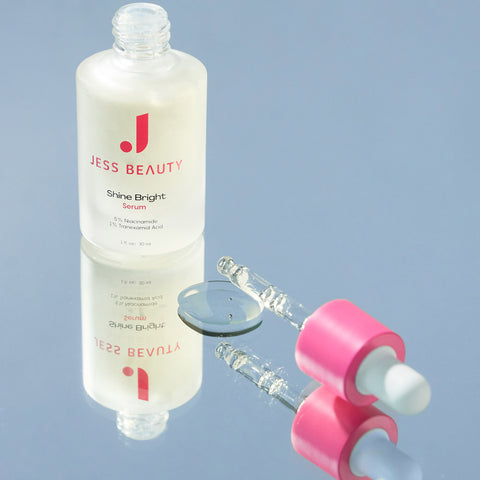
If you're not using a serum in your skincare routine, you might be missing out on something great.
Designed to nourish, protect, and hydrate, this product also often has visible short-term effects, which is perfect for those who are eager to see results!
Keep reading to learn about its benefits and find out how to choose the best one for your skin type.
What is a Serum?
A serum is a lightweight moisturizer that contains a higher concentration of active ingredients than classic moisturizers or hydrating gels. Additionally, since its consistency is also much thinner, it can be used in layers. However, your serum won't necessarily replace your regular moisturizer: it's usually recommended to apply it after cleansing the skin and before moisturizing.
The active ingredients they typically contain are hyaluronic acid, glycolic acid, or vitamin C, among others. And since the molecules in the serum are tiny, they can easily penetrate the skin and effectively deliver all the beneficial ingredients.

6 Amazing Benefits of Serums
Depending on the specific formula of the serum you choose, the benefits for your skin will vary. But in general, these are the most common benefits of face serums:
-
Hydrate deeply. Many serums are formulated with moisturizing ingredients that help retain hydration in the skin, which can help keep it soft and smooth.
-
Nourish the skin. Most serums contain ingredients that help nourish the skin, such as vitamins, minerals, and antioxidants.
-
Help even out skin tone. Serums can help lighten the skin and reduce the appearance of dark spots and discolorations, like our Shine Bright Serum. Thanks to containing tranexamic acid and niacinamide, it's ideal for evening out skin tone, as well as deeply hydrating and improving texture.
-
Reduce fine lines and wrinkles. Certain serums are designed to reduce the appearance of wrinkles and fine lines, either by stimulating collagen production or by relaxing facial muscles.
-
Reduce inflammation. Serums with anti-inflammatory ingredients can help reduce inflammation and redness in the skin.
-
Protect against free radicals. Antioxidants, which are some of the most common ingredients in serums, help protect the skin against harmful molecules that contribute to premature skin aging.

How to Choose the Best Serum for You?
First, check the ingredients and choose based on your skin type and what you want to achieve. Here are some tips:
If you're prone to acne, look for a serum with vitamin C. This ingredient will help increase collagen production, reduce inflammation, and help with skin repair. You can also look for a serum with zinc, which will soothe irritation and help regulate oil production, and with salicylic acid, which helps purify pores.
If you have dry skin, choose a serum with vitamin E, a powerful antioxidant that protects cells from oxidative damage, and niacinamide, which improves skin elasticity. Also, glycolic acid, which gently exfoliates, and hyaluronic acid, which helps retain moisture, can be great ingredients for you.
If you want to revitalize your skin, look for a serum with antioxidants like ferulic acid, green tea extract, and resveratrol, or niacinamide. These ingredients help fight free radicals and promote cell repair. For this, our Shine Bright Serum is particularly effective!
When in doubt, consult with your dermatologist so they can recommend a serum based on what your skin needs. And remember the golden rule: less is more! Since serums are very potent, a few drops are all you need.
Consulted material:
https://www.lorealparisusa.com/beauty-magazine/skin-care/anti-aging/reasons-to-use-serum
https://www.healthline.com/health/benefits-of-face-serum
https://www.bebeautiful.in/all-things-skin/products/6-ways-face-serum-benefits-your-skin







